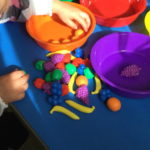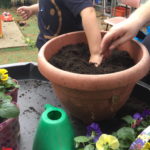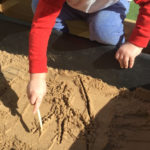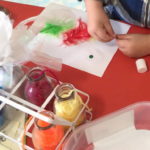How to Help Your Preschooler
There has been a lot of research recently into the value of primary schools giving homework to children and many schools have begun to move away from setting formal homework. Instead there is a lot of encouragement towards primary school aged children learning their times tables and reading and taking part in home activities.
“Children develop at their own rates, and in their own ways. The development statements and their order should not be taken as necessary steps for individual children. They should not be used as checklists. The age/stage bands overlap because these are not fixed age boundaries but suggest a typical range of development.”
Development Matters in the Early Years Foundation Stage (EYFS)
Preschools and nurseries are a long way from asking children to recite their six times table, or to read “Harry Potter”. However, although we believe that formal homework does not necessarily have a place for our children, we do believe that our children can still be actively involved in home activities.
We know our parents worry that their child is not writing their name, beginning to recognise key words or may struggle to count to 20 by the time they leave preschool, but, when looking at The Early Years Foundation Stage Guidelines, these are goals children are expected to meet by the time they are leaving reception class. If a child is writing their name and counting beyond 20 by the time they leave preschool this is great, but we support each and every child in reaching their own particular goals whilst they are with us.
Keeping that in mind we would like to encourage our parents to take part in regular home activities with their children. it is proven that children attending preschool and having parents who take an active role in encouraging home activities have higher opportunities during their GCSE and A Level Years, but it does not need to be formal homework.
If you are concerned about any area of your child’s development, please speak to their preschool. They will be able to advise you on how they and you can support your child.
Here are some suggestions for home activities:
Personal, Social and Emotional activities
Any time spent talking with your child, whether it is taking part in the activities we have listed below, or just spending time chatting with your child over breakfast or at bath time will help them develop their skills in interacting, listening, sharing and taking turns.
Reading a story to your child on a regular basis
Whilst reading the story:
Ask your child if they can guess what might happen next or what might happen at the end of the story. Read a story that has repeated refrains, so that your child can join in.
Talk about what they can see in the pictures.
For older children, point out familiar letters, such as the first letter of their name.
Pre reading and writing activities
Have a look at words that are around you all the time in the environment. Children will recognise familiar words such as ASDA, Tesco, Sainsbury, McDonalds, Argos etc. Sing nursery rhymes.
Encourage your child to sing their own songs and help make up nonsense rhymes.
Encourage your child to make their own shopping list of items you want using their own marks and then get them to help you find the items in the supermarket.
Reciting and counting with your child
Count how many bricks are in their tower they have built, or how many steps there are to the car from the front door.
Get them to help pair up and count socks in the laundry basket.
Count stairs
Let them lay the table, count out how many knives and forks they will need.
Have a look at door numbers and car number plates. Point out familiar numbers, such as your house number and their age.
Count out spare coins into a piggy bank or back into a purse!
Age appropriate board games.
Shape and measure activities
Use language such as big and little. E.g “Look at your shoes next to mine! My shoes are really big! You have little shoes!”
Talk about the shape of everyday objects “I can see that plate is a circle.”
Use language of time “We will go to the shop later, after we have had lunch.”
Gross motor activities
Play dough
Chalking with both hands in the garden.
Use water and paint brushes in the garden.
Throwing and catching balls.
Climbing stairs with support.
Climbing in and out of bed
Climbing into the car.
Fine motor activities
Allowing your child to put on their clothes.
Encourage your child to have a go at doing up buttons and pulling up zips once you have got them into the hook.
Threading
Play dough
Colouring
Snipping paper
Pegging out clothes on an airer
Sensory activities
We are very lucky to live in an area of the country where we are not far from wooded areas or the water front.
Take time to talk about what you can hear, see, smell , taste and touch what you might see on your journeys. A walk from home to preschool can be a great adventure.
“Listen! Can you hear the cars?”
“Look! Can you see the colour of the leaves on the trees?!
“Can you feel the fir cone I have picked up? I wonder if it feels rough or smooth?”
If you are down at the beach, ask if they can smell the sea.
Talk about what you are eating. “My toast is really crunchy! The marmalade is really sweet!”
Most importantly
Observe, wait and listen (OWL) to what your children are doing, saying and thinking and give them a chance to respond. It may take them a moment to process what you are saying or asking.
“Often when parents play with their children, in an effort to get their child talking, the parent ends up doing all the talking instead. They ask questions. They give directions. They bombard their little ones with so many words that they quickly & unintentionally take over the entire interaction. This is where O.W.L (Observe. Wait. Listen.) comes in.”
Buildingsblockslaguage.com (The OWL strategy was developed by The Hanen Centre, a non-for-profit organization that develops programs and resources for parents of children with language delays.)
“(The research) showed that positive parenting experiences, especially a more stimulating home learning environment when children were young, helped to promote better long term outcomes. A high or a very high (Home Learning Environment) HLE at early ages predicted both a higher total GCSE score and better grades in English and maths, and achieving the GCSE benchmark measures of 5 A*-C and 5 A*-C including English and maths.”
Department for Education . Preschool and early home learning effects on A-Level Outcomes. Effective Pre-School, Primary & Secondary Education Project (EPPSE) Research report October 2015 Pam Sammons, Katalin Toth & Kathy Sylva with Edward Melhuish, Iram Siraj & Brenda Taggart University of Oxford
“Gross motor abilities also have an influence on other everyday functions. For example, a child’s ability to maintain appropriate table top posture (upper body support) will affect their ability to participate in fine motor skills (e.g. writing, drawing and cutting)”
Kidsense childdevelopment.com.au




